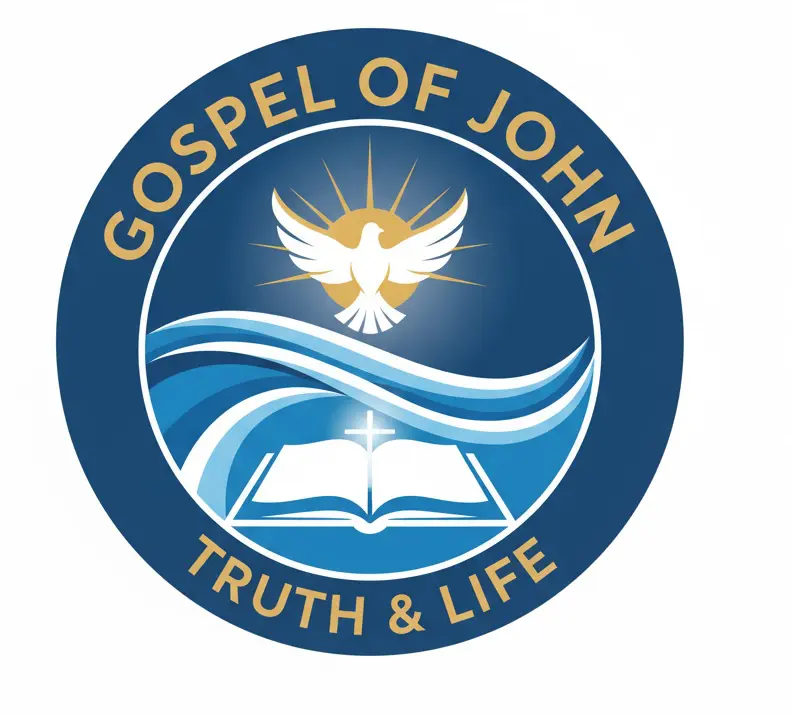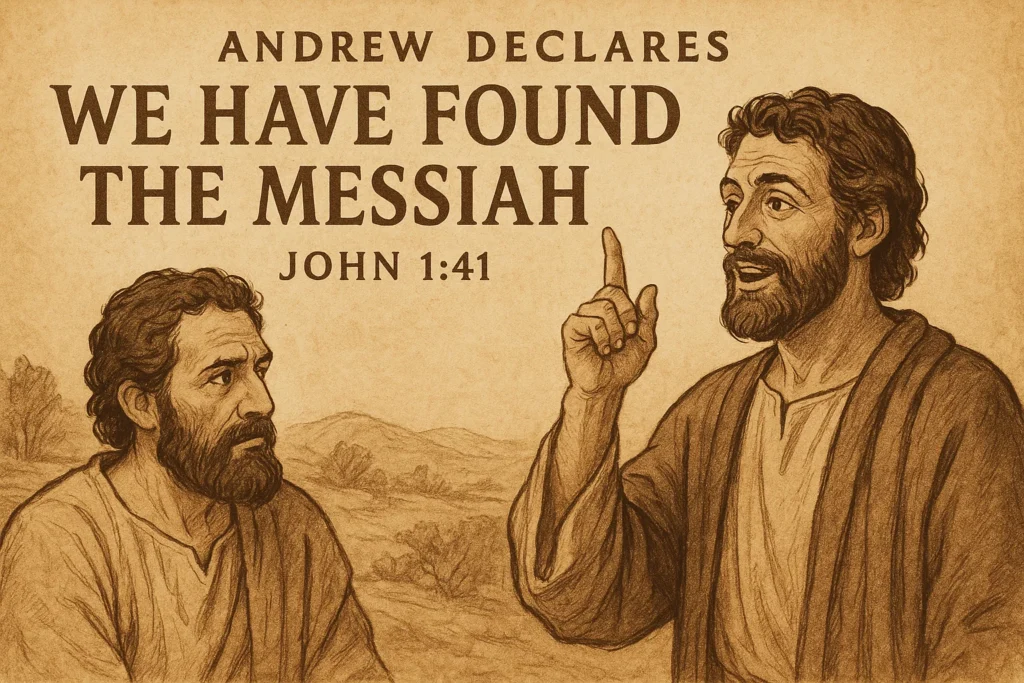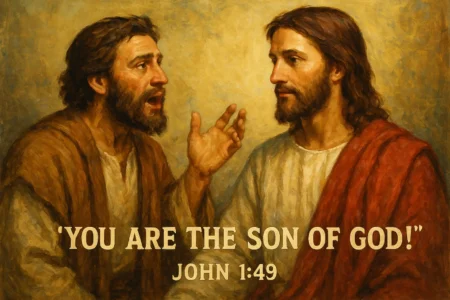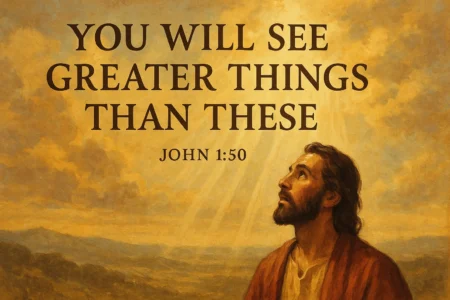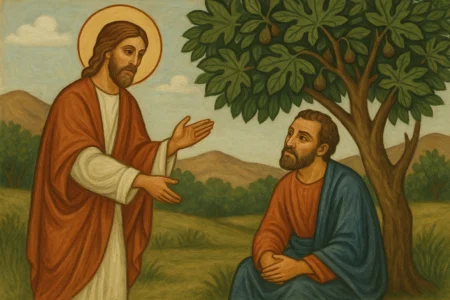We are all searchers. It’s one of the most human things we do. I still have this vivid memory from when I was a kid, maybe seven or eight, tearing my room apart. I was on my hands and knees, frantic, hunting for one specific, two-by-four blue LEGO brick. I was convinced my entire spaceship masterpiece depended on that single piece. I couldn’t finish it without it.
That feeling never really leaves us, does it?
As we get older, the things we search for just get bigger. We hunt for the right college, the right job, the right partner, the right purpose. We’re just wired to look for that “one thing” that makes all the other pieces of our lives finally click into place. We crave meaning.
The first chapter of John’s Gospel is electric with this exact energy. It’s full of people seeking, questioning, and longing. And right in the middle of this spiritual static, the author drops an explosive, simple sentence. It’s a declaration that slams the brakes on the search.
The verse is John 1:41. It reads, “He first found his own brother Simon, and said to him, ‘We have found the Messiah’ (which is translated, the Christ).”
This one line, from a man named Andrew, is the spark that lights a global fire. But what does it really mean? The profound John 1:41 meaning isn’t just about Andrew pointing a finger and saying, “That’s the guy.” It’s about the sudden, shocking culmination of a nation’s 2,000-year-old hope. And it’s the start of a personal, world-changing relationship that begins with a single, excited conversation.
Let’s dig in. This is a good one.
More in John Chapter 1 Category
Key Takeaways
- The absolute core of the John 1:41 is the stunning, real-time identification of Jesus of Nazareth as the “Messiah”—the “Anointed One” that Jewish Scripture had been promising for centuries.
- Andrew, a follower of John the Baptist, becomes the very first person to go and tell someone else about Jesus. His first instinct is to grab his own brother, Simon Peter.
- The verse itself acts as a translator, explicitly stating that the Hebrew “Messiah” is the same as the Greek “Christ,” building a bridge from Jewish hope to a worldwide audience.
- Andrew’s faith wasn’t born from a perfect theological understanding. It came from a profound personal encounter, showing that world-changing faith often starts with a relationship, not a flawless set of doctrines.
- This verse sets the timeless pattern for faith being shared: one person, utterly convinced by their own experience, runs to find someone they love and simply says, “You have to come and see.”
What’s Really Happening Just Before This Big Announcement?
You can’t just drop into verse 41 cold. To get the gut-punch of this moment, you have to see what happens just before it. This declaration isn’t a random guess; it’s the direct climax of a life-altering day.
The scene is set by John the Baptist. This guy is the rugged, no-nonsense desert prophet. He’s been shouting in the wilderness, preparing all of Israel for this exact moment. He sees his cousin, Jesus, walking by and makes a staggering claim to his own followers: “Behold, the Lamb of God, who takes away the sin of the world!”
Two of John’s disciples hear this. One is Andrew. The other is unnamed, but most scholars believe it was John, the guy writing this very Gospel, humbly writing himself into the story.
Hearing their trusted teacher’s testimony, they do something radical. They just… leave John. They turn and start following Jesus.
Jesus notices them, turns around, and asks perhaps the most penetrating question in the entire Bible: “What are you seeking?”
He’s not asking “Can I help you?” or “What’s up?” He’s asking about the core of their lives. That LEGO brick they’re looking for.
Their answer is telling.
They don’t say, “We’re seeking the truth” or “We’re looking for the Messiah.” They say, “Rabbi (which means Teacher), where are you staying?” It’s a brilliant, personal question. They don’t just want a quick answer. They want his time. They want access. They want to see how he lives.
Jesus’s reply is the great invitation of faith, then and now: “Come and see.”
The text tells us they “came and saw where he was staying, and they stayed with him that day, for it was about the tenth hour.” The tenth hour, by their count, was about 4:00 PM. This means they hung out with Jesus all afternoon, probably late into the evening.
We aren’t told a single word they talked about. We don’t know what questions they asked, what stories He told, or if they just sat in silence. But whatever happened in that room, it was so profound, so utterly convincing, that it shattered and rebuilt Andrew’s entire world.
He walked out of that meeting knowing.
So, Why Did Andrew and John Follow Jesus in the First Place?
Here’s the thing. Andrew and John weren’t aimless drifters. These guys were committed. They had already left their fishing businesses and their families to go live in the desert with John the Baptist. This means they were deeply spiritual men. They were seekers in the truest sense of the word.
They were part of a faithful sliver of Israel that was actively waiting for God to show up. They were fasting, praying, and repenting, living on the edge because they believed the Kingdom of God was about to break in.
So when John the Baptist—the man they trusted as a true, fire-breathing prophet—pointed to another man and said, “That’s Him. That’s the one I’ve been telling you about,” it was all they needed to hear. Their hearts were already primed.
It reminds me of my college days. I was “searching” for a mentor. I had professors I respected, but I was looking for something more. I was looking for someone whose life actually matched their lectures, someone who wasn’t just teaching a subject but embodying a kind of wisdom. When a friend told me about this one specific English professor, I didn’t just audit his class. I went to his office hours. I read his books. I sought him out.
Andrew was on that same hunt. But he wasn’t just looking for a good teacher. He was looking for the one who was the meaning of it all.
“We Have Found the Messiah” – What Did That Word Even Mean to Andrew?
This is the absolute heart of the John 1:41. That word, “Messiah,” wasn’t just a nice religious title. For a first-century Jew, it was a pressure cooker of 2,000 years of hope, prophecy, and desperate political longing.
“Messiah” (from the Hebrew Mashiach) literally means “Anointed One.”
In the Old Testament, you didn’t just decide to be a king or a high priest. You were anointed by a prophet, set apart by God with holy oil. That anointing meant God’s hand was on you for a special, world-changing task.
So, when Andrew said “Messiah,” what was in his head? What was he claiming Jesus was?
He was claiming Jesus was the fulfillment of everything.
For generations, they’d been living under the brutal thumb of Roman occupation. They were humiliated, overtaxed, and oppressed. Their “Messiah” was expected to be, first and foremost, a new King David. A warrior-king. A brilliant military and political strategist who would finally rally Israel, smash the Roman legions, kick the occupiers out of the Holy Land, and put Israel back on top.
But it was bigger than that. The “Messiah” was also prophesied to be the ultimate Prophet, a new Moses who would speak for God with final, binding authority. And he was also seen as the perfect High Priest, one who would finally cleanse the corrupt Temple system and make worship pure again.
So when Andrew says, “We have found the Messiah,” he isn’t just saying, “I met a really inspiring guy.”
He’s saying, “The wait is over. God has kept His promise. The new King David is here. The Romans are done. Everything is about to change. Forever.”
He’s here.
Can you imagine the jolt that must have sent through his brother Simon? It was the most audacious, thrilling, and dangerous claim anyone could possibly make.
Was Andrew’s Idea of the Messiah Actually Correct?
This is a fascinating and deeply human part of the story. Let’s be real: did Andrew, in that moment, understand the whole picture? Did he grasp the cross? The resurrection? The “Lamb of God who takes away sin“?
No way. Not even close.
Like nearly every other Jew of his day, Andrew’s hope was filtered through a political lens. His head was probably spinning with images of a new kingdom, of Roman eagles being torn down. He couldn’t yet comprehend the idea of a Messiah who would suffer. A Messiah who would be rejected by his own people, handed over to the enemy, beaten, and crucified like a common slave.
That concept was completely alien. It was a contradiction in terms.
And yet, this makes his declaration even more powerful.
His faith wasn’t born from a perfect, 10-point theological checklist. His faith was born from an encounter. He had spent an afternoon with Jesus, and in that time, he became utterly convinced of who Jesus was, even if he had no idea how Jesus was going to accomplish his mission. He just knew. He knew at a soul-deep level that this man was the Anointed One. The details could be filled in later.
It’s a powerful lesson. We so often think we need all the answers before we can commit. Andrew shows us that faith starts with a person. It starts with “Come and see.”
Why Is Andrew’s First Action So Unbelievably Significant?
So, you find the meaning of the universe. What’s your next move?
You don’t just go home and quietly journal about it.
Andrew’s first, immediate, instinctive reaction is to run. The text says, “He first found his own brother Simon…” The word “first” implies an urgent priority. This couldn’t wait. He had to tell someone, and the first person he thought of was his brother.
This is the birth of evangelism. And it’s not a program. It’s not a script. It’s not a sales pitch or an awkward, forced conversation.
It’s just pure, uncontainable excitement.
It reminds me of my professional life. I remember being hopelessly stuck on a complex coding bug for a solid week. I finally had a breakthrough, a ‘eureka’ moment where the entire solution unfolded. My first instinct wasn’t to quietly close my laptop and move on. It was to grab my co-worker, drag him to my whiteboard, and say, “Dude, you have to see this! I figured it out! It works!” My discovery was too big to hold in.
That’s Andrew. But his discovery wasn’t about a line of code. It was about the one who wrote the code for the cosmos.
This act defines Andrew for the rest of the Gospels. He’s often called “Andrew the Introducer.” He’s the guy who brings people to Jesus.
- Here, he brings his brother, Simon, who Jesus will rename Peter, the “rock.”
- Later in John’s Gospel, it’s Andrew who finds the boy with the loaves and fishes and brings him to Jesus.
- And later still, it’s Andrew who helps bring a group of curious Greeks to meet Jesus.
He’s not the star. He doesn’t preach the big, fiery sermon at Pentecost like his brother Peter does. He’s the quiet, relational connector. He’s the patron saint of “You’ve just got to meet this guy.” And without this “background” disciple, the “star” disciple, Peter, might never have become who he was.
What’s the Deal with the Greek Translation in the Verse?
You’ll notice that John, the guy writing this Gospel decades after it all happened, tosses in a little parenthesis: “…’We have found the Messiah’ (which is translated, the Christ).”
Why’d he do that? Why break the flow of the story?
Because John is a brilliant communicator. He’s writing for a diverse, mixed audience. His readers include Jews who know the prophecies inside and out, but also a huge number of non-Jews (Gentiles) who speak Greek, the common language of the Roman Empire.
- Messiah is the Hebrew word (Mashiach).
- Christ is the Greek word (Christos).
They mean the exact same thing: “Anointed One.”
By putting this translation right in the text, John is building a crucial bridge. He’s looking at his Greek-speaking readers and saying, “Hey, that man you worship as Jesus Christ? You need to understand that He is the very same person the Jews have been waiting for for millennia as the Messiah.”
He is connecting all the dots. He’s showing that Jesus isn’t just a new Greek philosopher or a local wonder-worker. He is the fulfillment of all the Old Testament promises. He is the universal Savior, the hope of the Jewish people and, through them, the entire world. That little parenthesis is a massive theological statement.
How Did This “Finding” Change Simon Peter?
This is where it gets so personal. Andrew doesn’t just text his brother the news. He doesn’t just say, “Hey, met a cool guy, you should check him out sometime.”
No. The text says he “brought him to Jesus.”
He facilitates an encounter. He gets his brother in the same room with Jesus. That’s the move.
And what happens? It’s stunning. Jesus just looks at Simon. He sees him. And before Simon can even say a word, Jesus renames him. “You are Simon the son of John. You shall be called Cephas” (which is translated, Peter).
“Cephas” in Aramaic and “Peter” in Greek both mean “rock.”
In that one, brief moment, Jesus speaks to Simon’s identity and his destiny. He calls out the potential, the future leader, the “rock,” hidden inside this rough, impulsive, loud-mouthed fisherman. This is the power of the introduction Andrew made. He brought his flawed, passionate brother to the one person in the universe who could see him for who he truly was and who he was meant to become.
It all started because Andrew was so convinced that he had to share his discovery. The John 1:41 isn’t just a statement; it’s an action. It’s a discovery that demands to be shared.
How Does This Verse Challenge Our Modern Approach to Faith?
Andrew’s journey is so… clean. It’s simple and organic, and it cuts through all the modern complexity we’ve built around faith. We get so tangled up in programs, in strategies, in feeling awkward.
Andrew’s path is a clear roadmap:
- Seeking: He was already looking for God’s truth with John the Baptist.
- Hearing: He heard the testimony of a trusted source (“Behold, the Lamb of God”).
- Following: He acted on that testimony and personally pursued Jesus.
- Encountering: He spent personal, unhurried time with Jesus (“stayed with him that day”).
- Believing: Based on that encounter, he became utterly convinced (“We have found the Messiah”).
- Sharing: His belief immediately overflowed into passionate, relational action (“He first found his brother”).
Today, we get stuck. We think we need to have a Ph.D. in theology before we can tell anyone about our faith. We think we need to have a slick, pre-packaged answer for every possible hard question.
Andrew had none of that. He had one afternoon with Jesus. That was enough. His “evangelism” was just breathless, personal testimony. “I found Him! You have to come and see for yourself!”
This challenges us to return to the simplicity of the encounter. Is our faith based on a personal, real relationship? And if it is, can we, like Andrew, find the simple, authentic words to invite the people we love to “come and see” too?
What Can We Learn from Andrew, the “First Disciple”?
Andrew is one of my favorite characters in the Gospels, precisely because he’s not the star. He lives in the shadow of his famous, bombastic brother. But his contribution is arguably just as critical.
What made him so special?
- He was humble. He was content to be the connector, not the main event. He brings Peter, who will become the leader of the apostles, and he seems perfectly happy with that. He’s not jockeying for position.
- He was relational. His first thought was his brother. His faith wasn’t a private, intellectual exercise. It was a shared reality, and the first person he wanted to share it with was family.
- He was curious and decisive. He heard John’s words and immediately acted. He had to see for himself. And once he was convinced, he acted again. There was no hesitation, no “I’ll sleep on it.”
- He saw the potential in others. He saw his brother Simon not just as a fisherman but as someone who needed to meet the Messiah. He believed the encounter would be as life-changing for Simon as it was for him.
This verse is a snapshot of one of the most important moments in history, and it was carried out by a seemingly ordinary man. As this insightful article from Luther Seminary on the first disciples points out, these “tales are more than anecdotes; they are paradigms of faith.” Andrew’s story is a paradigm for all of us.
What Does the John 1:41 Meaning Imply for Us Today?
This isn’t just a 2,000-year-old history lesson. It’s a living invitation. The John 1:41 meaning is a direct call to our own lives, right here, right now.
First, it’s a call to seek. Are we truly seeking? Are we asking the big questions? Or are we just passively scrolling through life, numbing ourselves with distraction? Jesus’s first question, “What are you seeking?” still hangs in the air, waiting for our answer.
Second, it’s a call to encounter. It’s not enough to just know about Jesus. Andrew’s life changed when he “stayed with him that day.” We are invited to do the same. That’s not a mystical, one-time thing. It’s the daily choice to “come and see”—to spend unhurried time in prayer, to read his words, to sit in silence, to find him in community.
Finally, it’s a call to share. When I first met the woman who would become my wife, I knew. And I couldn’t shut up about her. I told my friends, my family. It wasn’t a chore. It wasn’t a “sales pitch.” It was an overflow of my joy. I just wanted the people I loved to see what I saw.
Andrew’s discovery was infinitely greater. He had found the one his soul was looking for. He found the blue LEGO brick that made the whole universe make sense.
The John 1:41 is, at its core, the simple, profound story of one person finding the answer to everything… and running to tell his brother.
It’s that simple. And it’s that profound.
FAQ – John 1:41 Meaning
Why did Andrew immediately want to tell his brother Simon about Jesus?
Andrew’s immediate desire to tell his brother Simon was driven by his personal conviction and excitement upon discovering Jesus as the Messiah, showcasing a natural, authentic urge to share his life-changing experience.
What does the term ‘Messiah’ mean in the context of John 1:41?
In this context, ‘Messiah’ means ‘Anointed One,’ representing the hope for a divine deliverer expected to fulfill prophecies of a king, prophet, and priest who would bring salvation and restore Israel.
How did Andrew’s understanding of Jesus’ identity differ from what it ultimately was?
Andrew’s initial understanding was that Jesus was the political and military Savior foretold in Jewish hopes, but he did not yet grasp the much deeper significance of Jesus’ suffering, death, and role as the Lamb of God who takes away sin.
What lessons can modern believers learn from Andrew’s example?
Modern believers can learn the importance of authentic personal encounters, simple faith, immediate sharing of their experience, and the value of humility and relational connection in spreading faith.
